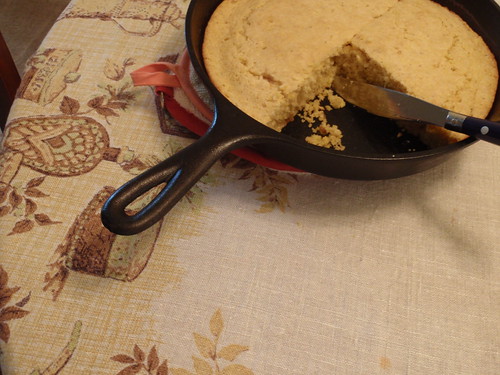I’m reading a fantastic book right now: Saved by Ben Hewitt. It’s about wealth that transcends money, real wealth, the kind that fills our daily lives with food and shelter and clothes. The book is on loan from Paul, who read it almost obsessively while we were camping a few weeks ago. (Paul is turning into my own personal lending library, which lends more evidence to the idea that what I really want to date is a library.)
I feel like I live somewhere between the extreme do-it-yourself lifestyle of rural Vermonters and the Standard American Lifestyle of living beyond your means through debt and consumerism. I like living in an apartment, with running water and electricity. I like my couch. I like my kitchen, with its cooking gear and pretty glasses and softly humming refrigerator. Tonight, I cooked dinner using two of my most important pieces of cookware, the cast-iron skillet you see above and my Le Creuset pot. My relationship with these pieces has gone beyond love: they are more like an extension of my body in the kitchen. They are strong and steady, resilient even in the face of damage. They remind me of a passage from Saved that I want to share with you tonight.
We speak of materialism as if it were something bad and even sinful, but sometimes I wonder if we have it all wrong. Maybe what we need isn’t less materialism, but more, to the point that we actually respect and even revere our material goods, rather than see them as disposable and constantly begging to be upgraded. Of course, it doesn’t help that disposability is purposefully engineered into the overwhelming majority of products offered to us. To seek out true quality requires the determination to look beyond the convenient venues of big box retailers and online mass merchants; needless to say, it also demands a willingness to pay for the upgraded materials and craftsmanship such quality demands.
I want to live my life in a way that’s reverent to the people and things around me, not because I want to worship them, but because they are my world. In a sense, taking care of our things now is like taking care of ourselves in the future. The more we care for them, the more likely they are to last, engineered disposability notwithstanding, of course.
PS I’m working on Part 2 for my last post. I hope to share it later this week, despite my tendency to be distracted by other projects :-)


3 comments:
I love that quote! Thanks so much for sharing it. I think it strikes a good balance between minimalism and actual reality. We need a certain amount of stuff - it's a part of living in the world - and I like the idea that it's not about how little we have, but how well we love and treat the things we do have.
wow, that's definitely an interesting way to look at it! and i'm tending to agree...
I'm glad you guys like the quote! To be honest, Chrissy, the thought of minimalism is a bit repulsive to me--in my heart, it feels too much like deprivation. "Oh, that? I can't have that--I'm a minimalist." I know it probably doesn't really work like that, but it's just my feeling about it. I like to call myself a "just-rightist." As in: I strive to have just the right amount of stuff. I want the right gear for the task, but I don't want stuff if I'm not going to use it or love it.
Shannon, as a baker, I'm sure you understand the idea of loving the stuff you use :-)
Post a Comment